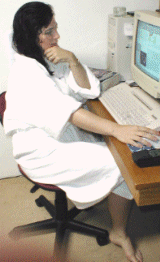


Giving advice to a student in another part of the world sometimes requires working at night in our homes. |
New Horizons for Learning on Neurosciences By Silvia Helena Cardoso, PhD Wherever we are, anytime, we have the opportunity to work toward the collective good See also Telementoring on Neuroscience |
New information technologies such as Internet are radically changing the way people interact. Global electronic networking is effectively destroying the old barriers of time and space and overcoming the borders between disciplines, institutions and countries. Access to knowledge, learning and dialogue is changing in an irreversible and global way.
I can tell by my own experience. As the author and editor-in-chief of "Brain & Mind", an electronic magazine on neurosciences, my email address is open to anyone who reads its papers and features. This has its consequences: exposure on the Internet almost invariably elicits a deluge of contact and interaction, so I have noticed that the number of students and professionals who seek information and advice on the neurosciences has been increasing steadily. At any time of day or night, they pop up on my computer screen, asking for advice about scientific projects, school work, scientific literature, where to find more information about a given subject, how to define neuroscientific concepts, or even how to find educational opportunities and to direct better their own future.
The instant and constant availability of authors, editors, lectures, teachers and researchers via the Internet is one of these revolutionary aspects of the networked world. This makes possible that anyone can learn anything, independently of his or her level of education or formal enrollment in courses, schools or universities. Students of all ages have sought me to ask for advice and counseling, from high school kids needing information for science fair projects, to medical students with a burning desire for orienting their future professional lifes. Careful and generous advice at the rigth time has the potential of literally transforming lifes, as I have seen many times. Availability is essential, and sometimes this means composing long emails late at night, in my home, without getting any financial reward for it, except for the beauty and warm feelings we get by helping others and by seeing how it works. There is even a name for this activity: telementoring!
My personal experience in the last years have convinced me that never has there been a time of greater challenge for education, and never has there been such an opportunity to rethink the whole process of learning . Educators, parents, business people, and other members of the community are asking fundamental questions such as: how can we help students to develop the flexible minds and higher order thinking skills to live in our rapidly changing world? How can we help students to master basic skills and information, develop understanding and knowledge, and learn to apply what they have learned?
Neurophysiologists such as Marian Diamond, at the University of California, Berkeley, point out the importance of stimulating, positive and nurturing environments in laying the physical, mental, and emotional foundations for learning. Much information is now available about the plasticity of the human brain and the modifiability of intelligence. We need new ways of assessing both potential and learning achievement and understanding how to create environments and using strategies and tools that make this possible.
Interactive technology and hypermedia are tools that promote highly enriched environments for learning and are been used by educators and students in powerful ways to further expand the human mind. They offer the means to explore intelligence in ways that are similar to how the mind works--sometimes sequentially and sometimes randomly.
We need educators with a strong sense of information science to help both students and teachers to explore these new virtual learning environments. We must encourage curiosity and exploration which are so inherent to the human being, particularly the younger ones. The evolution of society is requiring everyone to learn all the time. Our day-to-day task is to learn, preferrably not in isolation, but within a group of fellow human beings, in a cooperative way, transmitting ideas and producing new knowledge. In this manner, we will know each other better, and we will be more connected to the surrounding environment and people. We will have more leverage to propose solutions, solve our pressing problems, transform society as we know it.
In the gigantic, borderless cyberworld, we need urgently to master good navigational and interpretive skills. In this new order, the teacher's role is no longer just teaching but also inducing learning, i.e., to encourage the student to search for information and to construct his or her own knowlege. To advise, to show where to find reliable and strong information, to help the student reading, interpreting, relating and contextualizing information, are among the New Teacher's duties. Prof. Jacques Marcovitch, the dean of University of São Paulo, has emphasized correctly this trend, in his statement that "education will be more and more focused on the construction of knowledge by the student himself than on teacher-led instruction." This is the classical basis of "constructivism", or learning by discovery. Internet is the ideal medium for this discovery, there is no doubt.
Pierre Lévy, the noted researcher on the impact of new media on education from the University of Paris, France, thinks that we should no longer restrict educational activities to rigid, pre-molded study programs or to static categories; but instead, to allow for freer, more natural and organic processes of learning. Lévy is convinced that Internet gives people the unprecedented freedom to express themselves to the world and show what they know. Recent statistics (end of 2000) have shown that more than 25 million people in the USA alone have already contributed with information to the Internet (25% of the user population). Never in the history in the mankind there has been so many authors and teachers!
And we can do all this now! By showing students how to join this knowledge interchange process, how to be original thinkers and independent discoverers, how to share their knowledge about "gems" they found on the Internet, its way more important than just checking whether they have met a rigid list of learning objectives set up by a formal educational program. In this way ("learning by doing", "learning by discovering", "learning by teaching"), education becomes much more attractive, valuable and rewarding. Motivational problems which plague all levels of schooling can be partly defeated with this simple approach.
The revolutionary potential of telementoring is immense. Imagine, for instance, what "just in time learning" means. Since asynchronous learning is possible via the Internet, i.e., there is no need for a pre-determined school calendar, set times for starting or finishing a course, etc., they can be available all the time. If a person needs to learn something this week or for the next day, he or she will be no longer required to wait. In the future, enormous numbers of all kinds of asynchronous courses will be available, thus breaking up the old paradigms of traditional education.
Cooperating with communities, rewarding the activities of telementoring over the Internet, and building up the concept of Internet ethics related to this new activity are important steps as well. We have to keep in mind that before applying this extremely convenient tool, we have to reflect more on its true impact on education and on society as a whole. In addition, we must remember that Internet isn't a savior or panacea which can solve everything, and that technology is no substitute for personal contact and presence education.
The Author
 |
Silvia
Helena Cardoso, PhD. Psychobiologist, master and doctor in Sciences,
Founder and editor-in-chief,Brain and Mind Magazine, State University of Campinas. |
This page has been accessed
since
March, 2001
Copyright
2001 Silvia Helena Cardoso, PhD
State
University of Campinas